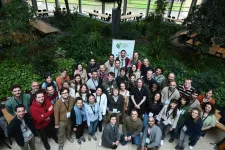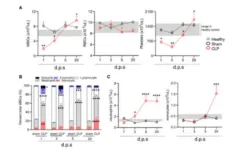(Press-News.org)
Systems Biology Ireland (SBI) at University College Dublin (UCD) and The Quantitative Biosciences Institute (QBI) at the University of California, San Francisco (UCSF), and) have announced the 2024 winners of the joint Research Fellowship Awards (RFAs).
The Research Fellowship Awards aim to support collaborative high quality and ground -breaking research proposals from QBI-UCSF and UCD in the areas of network biology and drug/drug target discovery.
The winning projects for 2024 are:
“Overcoming Resistance to HER2-Targeted Therapies in Breast Cancer,” from Oleksii Rukhlenko (SBI/UCD), Natalia Jura (QBI-UCSF) and Kliment Verba (QBI-UCSF);
"Targeting the lysosomal proteome in Huntington's Disease," from Danielle Swaney (QBI-UCSF) and Jeffrey Glennon (UCD); and
"Overcoming Resistance to MAPK Pathway Inhibitors in Pancreatic Ductal Adenocarcinoma," from Nevan Krogan (QBI-UCSF), Boris Kholodenko (SBI/UCD) and Nadia Arang (QBI-UCSF).
UCD and QBI-UCSF both contributed $75,000 in funds for the awards, with the total $150,000 to be split between the three projects. The three winning entries were selected by a panel of four experts following a call for submissions in October 2023.
Projects were required to have strong collaborations between researchers at QBI and UCD, with a view to ensuring future joint applications for larger scale external funding from bodies such as NIH/NCI – CRUK Grand Challenges, EU grants, SFI-US-Ireland R&D Programme, and others.
The Rukhlenko/Jura/Verba project winners were delighted to share their plans:
“The main aim of the current project is to obtain systemic understanding of resistance mechanisms in HER2-positive cancers and ways to overcoming resistance,” said Oleksii Rukhlenko. “This will be done by combining expertise in structural biology from Verba and Jura groups, and expertise in modelling and data integration from Rukhlenko group.”
The Swaney/Glennon partnership gave the following comment:
“We are thrilled to receive this funding. Huntington’s Disease is a devastating disease with marked cognitive and motor changes. This award will enable the Swaney (QBI-UCSF) and Glennon (UCD) groups to perform fundamental research probing proteomic-metabolic interactions in models of Huntington’s Disease. It is hoped this will lead to new intervention strategies.”
The awarded project from the Kholodenko/Krogan labs aims to address Pancreatic ductal adenocarcinoma (PDAC), an aggressive cancer with a serious mortality rate. The group said:
“To comprehend and overcome PDAC resistance, we plan to leverage a significant breakthrough from the SBI and QBI labs. SBI has pioneered a new powerful approach termed cell State Transition Assessment and Regulation (cSTAR), whereas QBI has pioneered advanced techniques in phosphoproteomics, interaction proteomics, and proteomics-to-genetics technologies. The received funding will help a joint SBI and QBI effort which will unravel resistance mechanisms, identify new therapeutic targets, and ascertain optimal drug combinations to overcome or significantly delay resistance in PDAC.”
“The joint RFA with QBI is both unique and exciting,” said Systems Biology Ireland (UCD) Director, Walter Kolch. “It was our hope that this call would attract submissions from researchers looking to fund original, bold studies that might otherwise be unlikely to gain support from more conventional grants.”
Andrej Sali, a member of the QBI Executive Committee and Professor in the Departments of Bioengineering and Therapeutic Sciences, as well as Pharmaceutical Chemistry at UCSF, said:
"Fostering collaborative research lies at the heart of QBI's mission, driving us to work on bringing together diverse research communities. These joint research grants with University College Dublin serve as a bridge, connecting scientists to maximize the synergy between their research programs. Together we are pushing the boundaries of what's possible."
END
Laura Soucek, an ICREA Research Professor, Director of VHIO’s Experimental Therapeutics Program, and Head of our Models of Cancer Therapies Group, has received a European Research Council (ERC) Advanced Grant to maximize the use of the first clinically viable MYC inhibitor.
This ERC funding program is amongst the EU’s most prestigious and competitive, providing leading senior researchers with the opportunity to pursue ambitious, curiosity-driven projects that could lead to major scientific breakthroughs. The new grants, worth in total nearly €652 million, are part of the EU’s Horizon Europe programme. ...
A drug approved to treat pulmonary arterial hypertension may be effective at managing hypertension and end-organ damage in patients with sickle cell disease, according to a new study published in Lancet Haematology. An early phase randomized clinical trial involving 130 patients with sickle cell disease found that the drug, called riociguat, was found to be safe to use and well tolerated in these patients and significantly improved their blood pressure. Preliminary efficacy data suggested the medication might improve heart function.
An estimated 100,000 Americans ...
B-Cubed’s Hackathon – “Hacking Biodiversity Data Cubes for Policy” – concluded successfully on 5 April in Brussels. The event marked a significant milestone in the use of data cubes for enhancing biodiversity data analysis and policy-making. Over four days, participants from diverse backgrounds collaborated to explore innovative solutions aimed at standardising and improving the accessibility of biodiversity data.
The event began with a foundational presentation on data cubes by Andrew Rodrigues ...
Rutgers Health researchers have found that hypertensive disorders in pregnancy are strongly associated with fatal cardiovascular disease for up to a year after birth.
Among the hypertensive disorders that cause dangerously high blood pressure during pregnancy — chronic hypertension, gestational hypertension, preeclampsia without severe features, preeclampsia with severe features, superimposed preeclampsia and eclampsia — all but gestational diabetes were associated with a doubling in the risk of fatal cardiovascular disease compared to women with normal blood pressure.
Eclampsia, a condition whereby hypertensive ...
Severe sepsis from bacterial or viral infections can be life-threatening and even people recovering from severe sepsis may experience long-lasting effects on the immune system, making them more susceptible to recurrent infections. The causes for this sepsis-induced immune suppression are not well understood and lack an effective treatment. To better understand the cause, Katherine MacNamara and colleagues from Albany Medical College, USA, analyzed the blood stem cells of mice with prior sepsis and their results were recently published in the journal Stem Cell Reports.
During ...
Concurrent occurrences of heatwaves and extreme short-term sea level rises at the same coastal locations significantly increased between 1998 and 2017 when compared to the preceding twenty years, reports a study published in Communications Earth & Environment. The study also suggests that these events may be five times more likely to occur between 2025 and 2049 under a modelled high emissions scenario.
A so-called ‘concurrent heatwave and extreme sea level’ (CHWESL) event is when a heatwave and an extreme short-term sea level rise occur at the same coastal location over the same time period. Although they ...
About The Study: The results of this study suggest that young breast cancer survivors without a germline pathogenic variant have a low risk of developing a second primary breast cancer in the first 10 years after diagnosis. Findings from germline genetic testing may inform treatment decision-making and follow-up care considerations in this population.
Authors: Kristen D. Brantley, Ph.D., M.P.H., of the Harvard T. H. Chan School of Public Health in Boston, is the corresponding author.
To access ...
About The Study: In this study that included 1,470 adults with chronic low back pain, physician empathy was associated with better outcomes over 12 months. Greater efforts to cultivate and improve physician empathy appear warranted.
Authors: John C. Licciardone, D.O., M.S., M.B.A., of the University of North Texas Health Science Center at Fort Worth, is the corresponding author.
To access the embargoed study: Visit our For The Media website at this link https://media.jamanetwork.com/
(doi:10.1001/jamanetworkopen.2024.6026)
Editor’s ...
Parasites thought only to infect tropical coral reefs have been discovered in a large variety of creatures in cold marine ecosystems along the Northeast Pacific, according to new research from University of British Columbia botanists.
The finding, published today in Current Biology, greatly expands the range of corallicolids, suggesting the parasites infect a range of organisms related to coral, like sea anemones and other cold-water marine invertebrates, around the world.
“This highlights significant blind spots in our strategies designed to sample microbial biodiversity,” says University of British Columbia biodiversity researcher Dr. Patrick Keeling, senior author on the ...
Researchers from Tokyo Medical and Dental University (TMDU) have developed a murine model for a highly progressive disease called “anti-MDA5 antibody-positive dermatomyositis”, providing insights into underlying biological mechanisms and aiding treatment
Tokyo, Japan – Some diseases involve autoimmune reactions, when the body begins to attack its own cells and proteins. The biological mechanisms underlying these diseases are often unknown, making treatment challenging. Now, a group at TMDU has created a murine model for a disease ...





